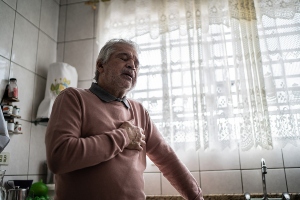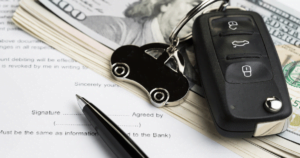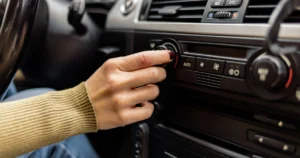Feeling chest pain after a car accident in South Bend, Indiana, can be alarming. While discomfort from the stress and impact of a crash is common, it could also signal something more serious. Seek medical attention to assess the severity of your chest pain.
Table of Contents
If you or a loved one is experiencing chest pain after a car accident, our South Bend car accident attorneys may help you defend your rights and fight for fair compensation against the liable party.
Contact us today for a free consultation: (574) 444-0741.
The Importance of Addressing Chest Pain

Chest pain following a car accident can range from mild to severe and may indicate underlying issues. You should take chest pain seriously, especially if it persists or worsens. Ignoring it could lead to serious complications or missed diagnoses.
Some chest pain injuries may not be apparent immediately. Adrenaline caused by the crash can mask important symptoms temporarily. Seeking medical treatment right after the crash can help doctors identify injuries before they become more severe.
In addition to protecting your health, the initial medical visit after a crash helps link your injuries to the crash by creating a paper trail of relevant documents, such as medical records and invoices.
What Symptoms Could You Experience With Chest Pain After a Car Crash?
It is important to get examined when having chest pains to ensure you get properly diagnosed and treated as soon as possible. Below, these are some of the physical symptoms that may cause chest pain:
- Bruising or tenderness
- Soreness
- Discomfort when coughing or sneezing
- Stiff feeling in the chest
- Mild swelling
- Fatigue
- Cold sweats
- Pain in Jaw or Neck
- Shortness of breath
- Irregular or rapid heartbeats
- Dizziness or Lightheadedness
- Crushing or searing pain (feels like pressure, fullness, burning or tightness in the chest)
If you have any of these symptoms, you should seek immediate medical attention. Downplaying or ignoring these symptoms could put your health at risk.
Common Causes of Chest Pain After a Car Accident
Chest pain should never be ignored. Below we discuss some of the different reasons you could be having chest pains after a car crash, but you should always seek immediate medical attention to rule out anything that could put you at risk.
Musculoskeletal Injuries
After a car accident, musculoskeletal injuries are common. If you are feeling a sharp pain in your chest, it could be caused by strained muscles or bruised ribs due to the crash impact or restraints from the seatbelt. This type of pain should improve with rest and over-the-counter pain medication.
Cardiac Concerns
Sometimes the stress of a car accident can bring on a heart attack, especially for crash victims with underlying medical conditions. Cardiac pain typically feels like pressure or tightness in the chest and may radiate to the arm, neck or jaw. This type of pain may also be accompanied by shortness of breath, dizziness or nausea.
Internal Injuries
Trauma from a car accident can cause injuries to internal organs, such as the lungs or heart. These injuries might result in severe and persistent pain, which requires immediate medical attention.
Referred Pain
Chest pain might originate from injuries elsewhere such as the abdomen or back. This happens because the nerves in your body are interconnected, and sometimes, the brain misinterprets the source of the pain signals.
Whiplash
Whiplash, common in rear-end collisions, is a neck injury caused by sudden head movement. It causes neck and shoulder pain, sometimes extending to the chest, with muscle stiffness and soreness. Treatment includes rest, ice and, in some cases, physical therapy.
Bruised or Fractured Ribs
Your chest may hit the steering wheel due to the impact of a car crash. This type of injury causes concentrated pain in the chest that worsens with movement, deep breaths or coughing.
Bruised ribs typically heal with rest and over-the-counter pain relievers, while fractures need more time. Depending on the case, fractures may require casts, braces, physical therapy or surgery. Monitor symptoms and consult a doctor to rule out complications like punctured lungs.
Pneumothorax
A pneumothorax occurs when air escapes from the lung into the space between the lung and chest wall, causing sharp, sudden chest pain and difficulty breathing. This medical emergency requires immediate treatment, often involving a needle or chest tube to remove the trapped air and re-expand the lung.
Internal Bleeding
Trauma from a car accident can cause internal bleeding, leading to significant chest pain and swelling. This serious condition requires urgent medical attention. Symptoms include severe pain, swelling, pale skin, and rapid heartbeat.
Heart Contusion
A direct blow to the chest during a car accident can cause a heart contusion, bruising the heart muscle. For example, if a passenger’s chest gets the dashboard due to a high-speed collision, they could have a heart contusion. This rare injury results in chest pain like a heart attack, with pressure, tightness and pain radiating to the arm or jaw.
Diagnostic Tests That Can Help Determine the Cause of Your Chest Pain
If you go to the ER with chest pains, doctors will likely conduct various diagnostic tests to help pinpoint the underlying issue. Here’s how each test contributes to identifying the cause:
- X-rays: Used to detect fractures, dislocations and rib injuries from collisions and can also reveal internal bleeding around the lungs or chest cavity.
- CT scans: Provide detailed cross-sectional images of the body, which help detect complex internal injuries like lung contusions, pneumothorax and significant internal bleeding that X-rays might miss.
- Electrocardiogram (ECG) Tests: Record the heart’s electrical activity, which is essential for diagnosing issues related to chest pain, such as heart attacks, arrhythmias, ischemia or any other related issues.
- Blood Tests: Used to detect heart damage or internal bleeding biomarkers, such as elevated cardiac enzymes like troponins after a heart attack and changes in hemoglobin or blood cell counts.
Seek Legal Help After Chest Pain From a South Bend Accident
If your chest pain is due to a car accident caused by someone else’s negligence, you may be able to seek compensation for medical expenses, lost wages and other damages.
Our South Bend, Indiana, personal injury attorneys can answer your questions about the legal process and determine if you may have a case.
If we represent you, we can help you gather evidence, negotiate with insurance companies and fight for the fair compensation you deserve. There are no upfront costs or fees to pay.
Call our trusted law firm today: (574) 444-0741













